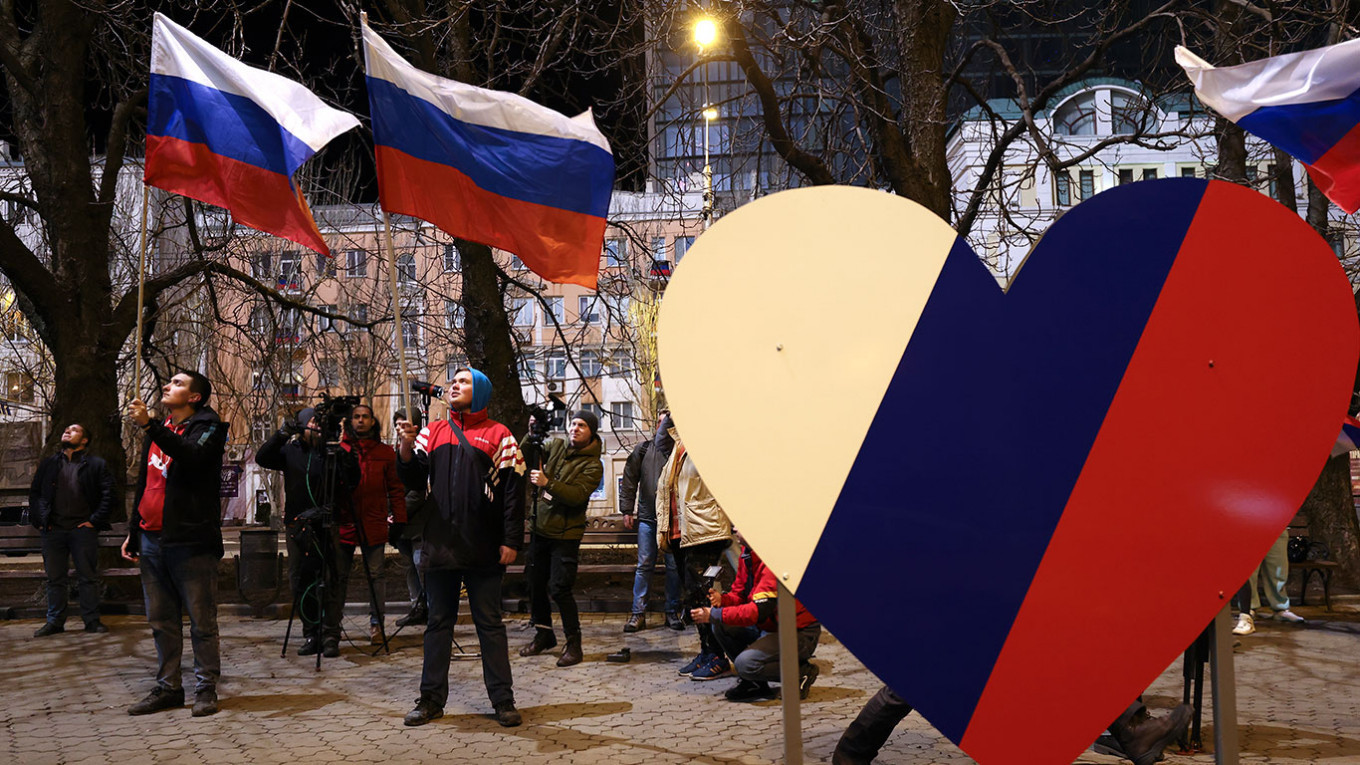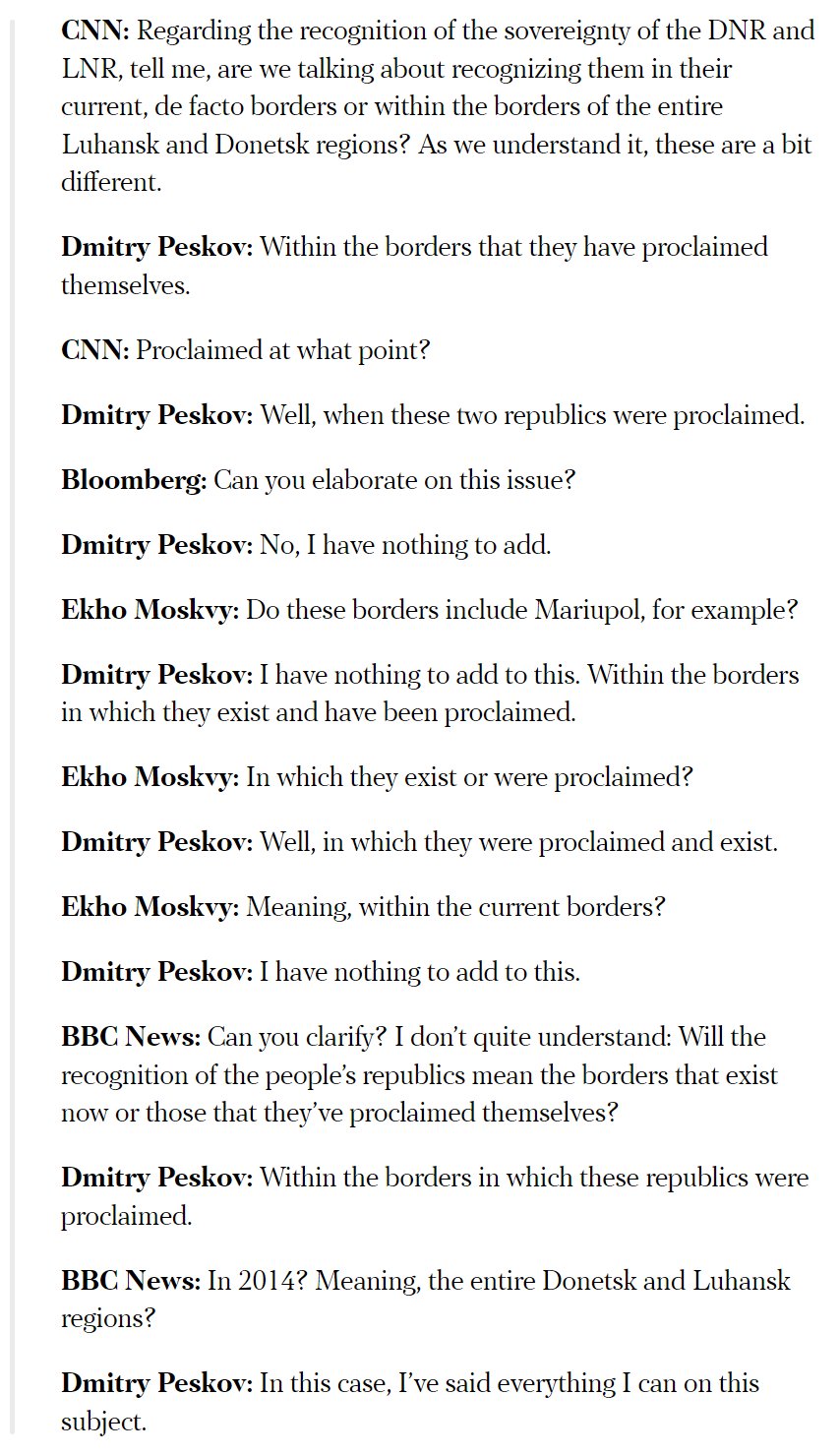RA’s Daily Russia News Blast – February 22, 2022

Today in Russia/CIS: Russia recognizes DPR and LPR, but which borders?;’ History professor (and President) Putin delivers fiery speech; Lavrov re-writes the rules of international sovereignty; UK and EU roll out initial sanctions, and Washington plans big moves; Nord Stream 2 finally meets its end after a slow, painful death; Zelensky’s speech; White House: On second thought, that’s an invasion; How will China respond? Russia to evacuate all diplomatic staff from Ukraine
Recognition as escalation. Late on Monday night, President Vladimir Putin recognized the Donetsk and Lugansk “People’s Republics,” the breakaway territories in Ukraine’s eastern Donbas region. But the Kremlin – and the Foreign Ministry, and other arms of government – don’t seem quite to be on the same page as to what this means. Foreign Minister Sergei Lavrov seemed to suggest that this meant Russia had recognized the rather optimistic official borders, while others seemed to think Russia was just recognizing the territory that the breakaway regimes actually controlled (the difference in territory covered is considerable).
Then came Kremlin Spokesman Dmitry Peskov, who had a go at answering journalists’ questions about which boundaries Russia was actually recognizing without actually answering them. It seemed to cause some confusion, with the likes of the Washington Post reporting that Peskov said the expanded borders had been accepted.
Have a look for yourself – the only thing that is clear from Peskov’s remarks is that he is doing his best not to answer the question (Credit to Kevin Rothrock of Meduza):

Putin’s latest remarks bring scary clarity. As this newsletter was about to be published, Putin provided clarity on the issue: Russia is recognizing the entirety of the claimed territories in Donetsk and Lugansk. In a barely veiled threat, Putin warned, as FT Bureau Chief Max Seddon helpfully summarized, “Russia’s troops would not necessarily go in ‘right now’ but warned that Moscow would ‘fulfil the obligations it has undertaken if necessary’ and said: ‘Predicting specific possible actions is impossible, it depends on the situation.’” It is difficult to view this as anything other than a call to war.
History professor Putin. President Putin delivered a shocking set of remarks last night regarding Ukraine and how he views the country in relation to Russia. In short, the Russian President does not see Ukraine as an independent state. Putin declared, among other things, that Ukraine suffers from “extreme nationalism . . . aggressive Russophobia and neo-Nazism,” and “The US and Nato have shamelessly turned Ukraine into a theater of potential military action against Russia,” Putin says. “Ukraine’s armed forces may well be commanded directly from Nato HQ.” The President also delved deep into Ukraine and Russia’s history to claim that Ukraine is not actually a sovereign nation, concluding that it owes its independence to Lenin’s Soviet nationalities policy, and “Ukraine is not just a neighboring country for us. It’s an inseparable part of our shared history, our comrades and relatives.”
Sergei rewrites the rules of the international system. Sergei Lavrov declared that Ukraine does not have rights as a sovereign country, a dubious claim that would likely form the basis of justification for further military action against Ukraine. Interfax reported that Lavrov declared, “If we talk about the principle of sovereignty and territorial integrity, then one of the key documents that all lawyers consider as the basis for interpreting the (UN) Charter is the declaration on the principles of international law relating to friendly relations between peoples. This declaration has never been questioned anywhere.”
Markets don’t like invasions. Russian markets are taking a serious hit after last night’s announcement that it would recognize Donetsk and Lugansk. Moscow Times wrote that Russia’s Central Bank “loosened its capital requirements for Russian financial institutions amid extreme market volatility following Moscow’s decision to recognize separatist regions in Eastern Ukraine,” and the “regulator said Tuesday it will give banks flexibility over how they account for government bonds and other assets on their balance sheets to avoid the need for possible multi-million dollar fundraising to fill the holes left by cratering prices.” Stocks are down by as much as 20% and the ruble having slid past the symbolic level of 80 against the U.S. dollar.
A slow death finally met. Nord Stream 2, the beleaguered gas pipeline running between Russia and Germany is officially mooted, after years of controversy and threats of cancellation and sanctions. German Chancellor Olaf Scholtz declared that “The situation now is a different one.“ Dmitry Medvedev, the former President and Prime Minister tweeted, in an attempt to rub salt in the wounds, “Welcome to the new world where Europeans will soon have to pay 2,000 euros per thousand cubic metres!” The $11 billion project was completed in September but has sat idle as the EU and Germany have held it up, ostensibly over regulatory issues. But the project now is officially, indefinitely, frozen.
Zelensky speaks. Ukraine’s President Volodymyr Zelensky addressed the nation at 2am local time on Tuesday morning. BuzzFeed correspondent Christopher Miller tweeted, “President Zelensky addressed Ukrainians after 2am local time. ‘We are not afraid. We won’t cede anything.’ He said Putin withdrew from Minsk Agreements by ordering troops into Ukraine officially. He called for emergency meetings of OSCE, Normandy Format, UNSC.
It’s an invasion, actually. The White House has had trouble explaining its position as to whether Russia’s actions up to this point amount to an invasion. Politico Playbook wrote “As of Monday night, the White House was refusing to call this an “invasion” — though we’ll see how long that lasts given public pressure from lawmakers. Senior administration officials were awkwardly dancing around the matter in a background briefing with reporters, refusing to answer the “i-word” question because of the consequences it would bring.” But White House Principal Deputy National Security Advisor Jonathan Finer said today, “We think this is, yes, the beginning of an invasion, Russia’s latest invasion into Ukraine, and you’re already seeing the beginning of our response.”
Sanctions plans. UK Prime Minister Boris Johnson announced an initial round of sanctions against Russia today. BBC wrote, “Five banks have had their assets frozen, along with three Russian billionaires – who will also be hit with UK travel bans.” The EU has “also announced plans to target members of the Russian parliament, as well as banks financing Russia’s military.”
The US has not made any specific announcements on wider sanctions yet, although President Joe Biden is set to speak soon on the issue, and on Monday night immediately announced sanctions on the entirely of the DPR and LPR. Foreign Policy also wrote of a wider plan which may have much more serious consequences for Russia: Enlisting East Asian allies to put in place “restrictive export controls, including on semiconductors,” which may have a far more serious effect on Russia’s economy than the traditional set of sanctions that have been deployed until this point. FP wrote,
Washington has so far received support from Singapore, Japan, and Taiwan for plans to implement restrictive export controls on Russia, three U.S. sources tell Foreign Policy, part of a broader sanctions package aimed at crushing Russia’s economy and technology sectors should the Kremlin move forward with plans to launch a full-fledged invasion of Ukraine. The three Asian countries are major producers of semiconductors, computer chips, and other high-end technological exports that Russia is reliant on.
And China? China has found itself in quite the unenviable position as its ostensible partner Russia seems poised to launch a military adventure in Ukraine. The PRC has long held the position of “non-interference in other countries domestic affairs,” so finding a coherent policy response to the current situation will likely prove a lose-lose bargain for Beijing. Bill Bishop, one of the pre-eminent China watchers and your humble Russia News Blast author’s favorite source on all things China, wrote in his newsletter yesterday (hard paywall):
The Ukraine crisis looks to be much less of a “win” for the PRC, and in fact carries significant risk of the bottom falling out of its relationships with the EU and the US.
I do not believe that Xi and his team want to see Russia invade Ukraine, as they understand the risks from the expected reaction to any invasion. Over the weekend Foreign Minister Wang Yi weighed in at the Munich Security Conference and said that the “parties concerned should come back to the Minsk II agreement of 2015”.
Unfortunately for Wang and the PRC, Putin, who at least waited until the Olympics were over, looks to have already ruled that out today when he announced he would “recognize Russia-backed separatists in the so-called Donetsk and Luhansk People’s Republics.”
Will the PRC condemn Putin’s declaration? That seems unlikely, in which case expect the US government and at least some EU governments to see the PRC as complicit, something the PRC has been trying to avoid.
Evacuation. Russia announced that it would evacuate all diplomatic staff from Ukraine. Kommersant reported on Tuesday evening, “Russia will soon evacuate embassy personnel from Ukraine, the Russian Foreign Ministry says. Russian diplomats in Ukraine received threats of physical violence.”
PHOTO: Residents of Donetsk demonstrate their support for Russia’s recognition of the Donetsk People’s Republic (Alexander Ryumin / TASS)











